Snakes are often misunderstood and many people have a fear of them. Snakes can be pretty intimidating, but they usually just want to avoid you. They may yawn in order to cool down their body temperature or get rid of any parasites that could be living in their mouth. In this blog post, we’ll take an up close look at why snakes yawn and what it means when they do!
Why Do Snakes Yawn?
The term “yawning” is used for two different behaviors in snakes. The first, gaping of the mouth which looks like a yawn does not directly relate to the question “Why Do Snakes Yawn?”, but it is still thought that it has something to do with temperature regulation – specifically, regulating their body heat. When they feel too warm, they open up their mouths and gape in order to cool down quicker by letting out hot air from within them before breathing in cooler outside air. There are direct nerve connections between parts of your brain responsible for controlling mouth opening and areas that control actual breath intake (I wonder how you say ‘opening’ when referring to an animal’s mouth!?). It can also be seen as part of a defense mechanism, as they will also gape and open their mouths when threatened or scared by a predator.
The second yawning behavior that snakes do is more relevant to the question “Why Do Snakes Yawn?”. This involves only opening up certain parts of your jaw (and not all) which can be seen as an expression similar to what humans might use if tired, bored, angry etc… But why would this action have anything to do with these emotions? In order for us to understand some possible reasons behind it we first need some background information on snake physiology. There are four types of bones in your jaws: quadrates, articulars, coronoid bones and dentary . The first two work together as a joint while the other two make up your jaw. This is similar to human beings where we have a joint in between our skull and the first vertebrae (where the head connects with the neck), but this does not really apply when considering yawning, so let’s keep it at that!
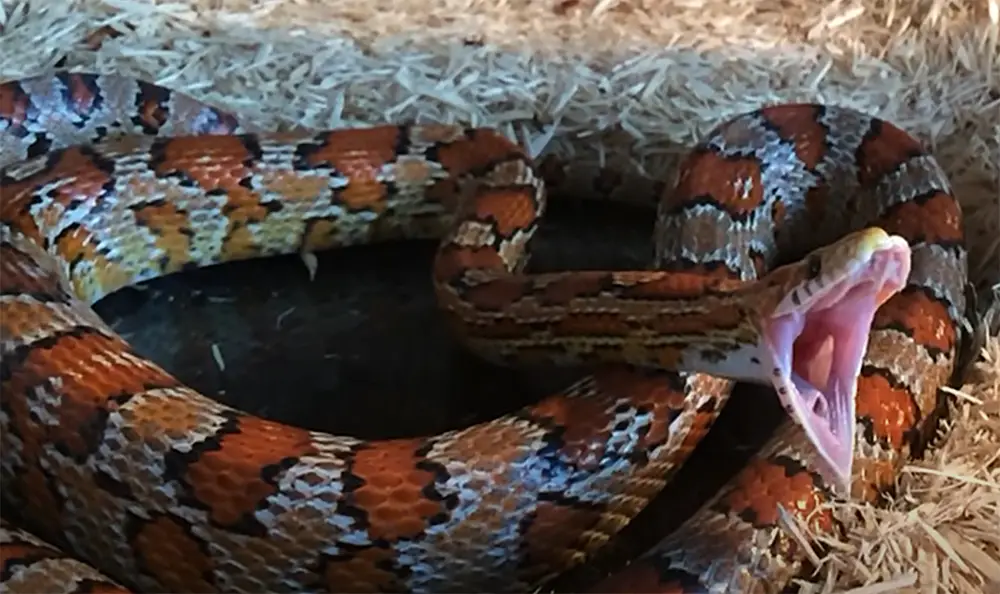
Snakes do not have any ear drums or eardrums like us humans or other animals such as birds who rely on their ears for balance. Instead they use something called “lateral lines” which are basically lines of scales along either side of their body that help them detect movement and vibration through water or air currents around them – an excellent sense used when hunting prey underwater. These lateral line organs contain neuromasts, sensory receptor cells sort of like microscopic hairs inside these scales that are able to detect movement in the water or air. The neuromasts within these scales are also considered mechanoreceptors, but what is important here is that they can actually sense vibrations produced by sound waves!
Time for dinner!
Snakes can be seen yawning before they strike, and this is often associated with their mouth opening wide – much like we do when we’re tired or bored! But why exactly does a snake yawn? For most animals, the movement of one jaw side-to-side has been used as an aggressive signal towards other individuals – but snakes have turned this on its head.
Snakes don’t actually use their upper jaw to chew food. It is simply there for support and helps hold prey in place while it’s being swallowed whole (or cut into pieces). The lower half of a snake’s jaws are attached by flexible ligaments that allow them to stretch far beyond what you would expect from just looking at them. When a snake yawns, it pulls its mouth open with the upper jaw and leaves it in this position for several seconds while simultaneously contracting muscles on either side of their head. Yawning is sometimes accompanied by hissing or posturing to make themselves appear larger by puffing up! So next time you see a snake yawn at your feet, don’t stand still – they’re trying to communicate something important.
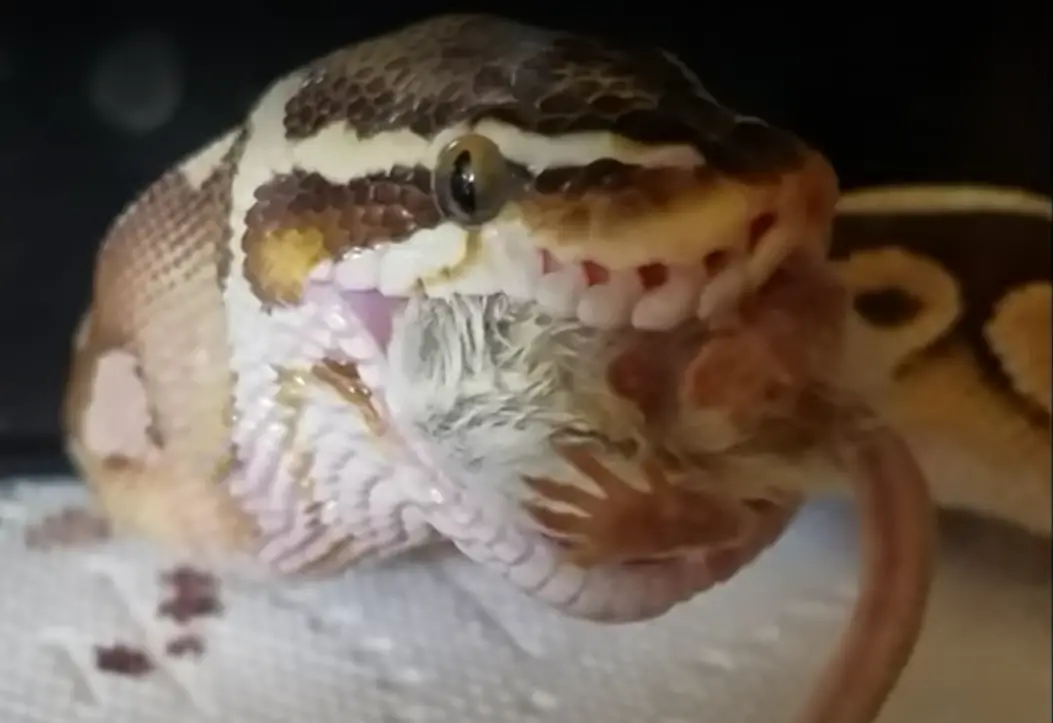
Health concerns
Understanding your yawning snake
A snake may yawn when they are uncovered from their hiding spots, during a shed cycle or just after eating. They will also yawn if you pick them up because it is likely that your hands smell like food to them! Yawning in snakes helps regulate their body temperature and aid digestion. It is also a way for snakes to show submission or fear.
Yawning always causes the snake’s mouth to open, exposing their teeth and letting out an audible noise (this is called gaping). Gaping should not be confused with hissing because this shows that your fanged friend means business! Snakes will only gape at other animals if they feel threatened by them; it is never used as a threat towards people. Though it can happen when you hold or handle your pet too tightly. If one of these situations arises where you see yawning in your reptile, make sure to give him/her more space during handling sessions so they do not get stressed out and cause any harm to themselves!
The next time you see your snake yawn, take a moment to understand why they are doing it.
Why Does My Snake Yawn?
Snakes are one of the most misunderstood creatures on earth. They’re not slimy, they don’t bite unless provoked and can be very gentle when handled correctly. One topic that gets a lot of attention is why snakes yawn. There are many different reasons as to why you might see your snake open its mouth wide for extended periods but here we will take a closer look at some common explanations behind this behavior.
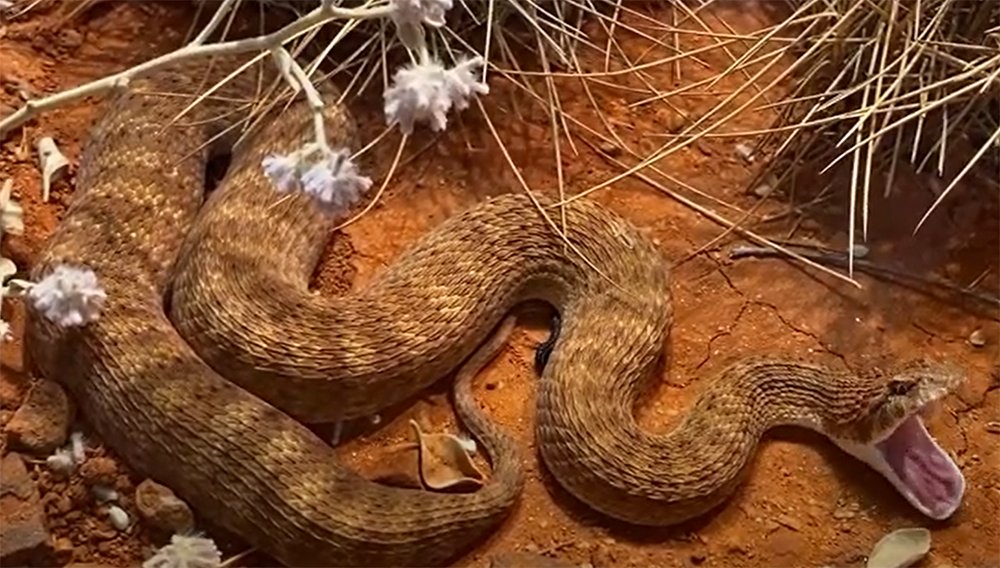
They’re Feeling Stressed Out! This is one of the most common reasons behind a snake yawn. When stressed, snakes often show an open mouth and may even make hissing sounds to intimidate their predators or other animals in the surrounding environment. If you notice this behavior from your pet, it could be because they feel threatened by something such as another animal entering their cage or perhaps too much heat being generated inside which makes them uncomfortable during hibernation time. On rare occasions, some people have reported that if exposed to certain chemicals found in bug sprays for example on surfaces where rodents are removed via poison bait traps placed under the floorboards of homes, this can cause extreme stress resulting in constant yawning.
Do Snakes Yawn When Tired?
Snakes may yawn before going into a shed cycle, but it’s not necessarily because they are tired. Yawning is also thought to help rid the mouth of any debris from their last meal or from potential prey items that might be stuck in there after swallowing something too big. In addition, the yawning motion helps to equalize pressure in their ears and sinuses.
Is a Snake Yawn Normal?
If you’re worried about what a snake may be trying to tell you with its behavior, it is important to look at other aspects of their body language. A common sign that something might not feel right for them is when they are hunched over or coiled too tightly; if this happens, don’t try to approach them since doing so could stress them out even further! It’s also possible that they simply ate recently and do not need any food from you . There isn’t one “normal” reason why snakes yawn but there are several possibilities which we have outlined above.
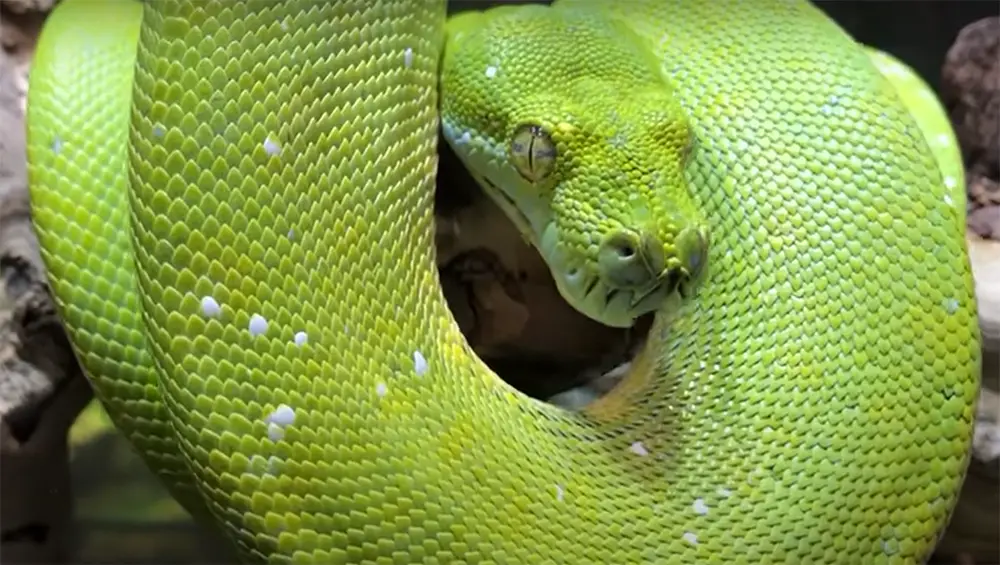
Do Snakes Yawn When Hungry?
Another reason why snakes might yawn is because they are hungry. When a snake hunts, it must be able to catch its prey quickly without wasting time on moving around too much. This means that their jaw muscles need to be strong and ready for action at any moment’s notice! A good way of strengthening these muscles is by opening the mouth wide enough so that each side stretches out.
Can You Feed Your Snake When They Yawn?
If you see your snake opening its mouth wide while hissing at you , don’t try to feed him . It’s best to wait until the next day so check up on what could have caused the abnormal behaviors first-hand. If there might be something wrong with them, waiting another 24 hours won’t make things any worse. At this point, it’s still possible to feed them if they are hungry so be sure to remove any uneaten prey items within the next 24-48 hours in order for that food not to spoil.
Why Do Snakes Yawn After Eating?
When a snake eats, it has to work hard and expend energy. It’s less of an issue for larger snakes that can swallow bigger prey, but smaller ones still have to fight with their meal until they get the job done. Once you know what is involved in eating and digesting food for these reptiles and why yawning after meals is so important, we think you will understand more about this exciting topic! Snakes do not chew their food like many mammals; instead they unhinge their jaws so that big chunks of flesh can pass down into their bodies without having been broken up first. This means that once a snake finishes its meal, there are often large pieces of tissue left over which would sit around in the stomach or intestine. If these chunks of flesh rot, this is extremely dangerous for the snake as it can lead to fatal infections and diseases that affect their internal organs. Yawning after a meal helps snakes get rid of those undigested pieces of food by forcing them out through the abdominal muscles which are located just under its scales on either side of their bodies.
Is a Snake’s Yawn Another Sixth Sense?
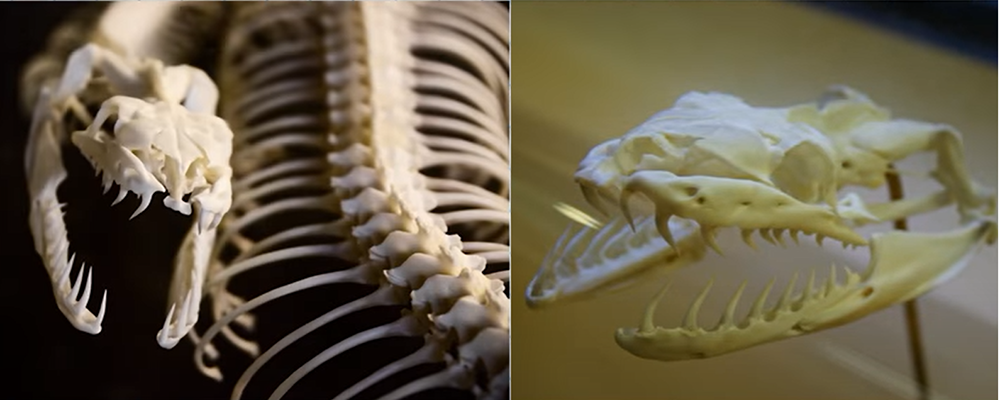
Some believe that the snake leaves its lower jaw open after yawning as another way of keeping itself cool. There are claims that snakes do not actually “yawn” but rather, they expand their jaws to release excess heat and gasses which build up in their mouths during periods of extreme exertion or stress. Snakes can also use this technique when they swallow large prey items like rats; it helps them relax muscles without disrupting the food down their throats.
Do Snakes Yawn When Stressed?
Snakes are not mammals and do not have the same body temperature that humans or other warm-blooded animals would. Snakes don’t maintain a constant internal body temperature, but instead their environment dictates how they feel at any given time. While this is mostly true for snakes in the wild, it does apply to captive ones as well meaning your snake could be feeling stressed even when you can’t see anything wrong with them.
Merely opening up their mouth doesn’t necessarily mean they’re bored or tired of being held either although this is also very common especially if you’ve been holding them all day long! However, there’s something other than boredom behind why adult snakes tend to yawn repeatedly – food intake just prior to feeding sessions has a lot to do with it. In other words, they’re actually hungry!
If you’ve been holding your snake all day long and then offer him a meal right before going to bed without having one in the past 12 hours or so this is exactly what’s happening here – he sees food as soon as his body senses that there might be something to eat around which leads them into yawning more often than usual. If their mouth opens up partially when looking for prey it means they’re ready for hunting making this behavior much easier to detect among snakes compared even though yawning isn’t associated directly with feeding according to herpetologists (scientists studying reptiles).
Why is My Snake Yawning So Much?
The “yawn” is a behavior that snakes use to regulate their body temperature. It can also be used as an appeasement gesture when one snake encroaches on another’s space, such as during mealtime or when they’re cohabitating in the same enclosure. Yawning is usually accompanied by hissing and tongue flicking which makes it easier for the other snake to recognize what he/she should do: move away!
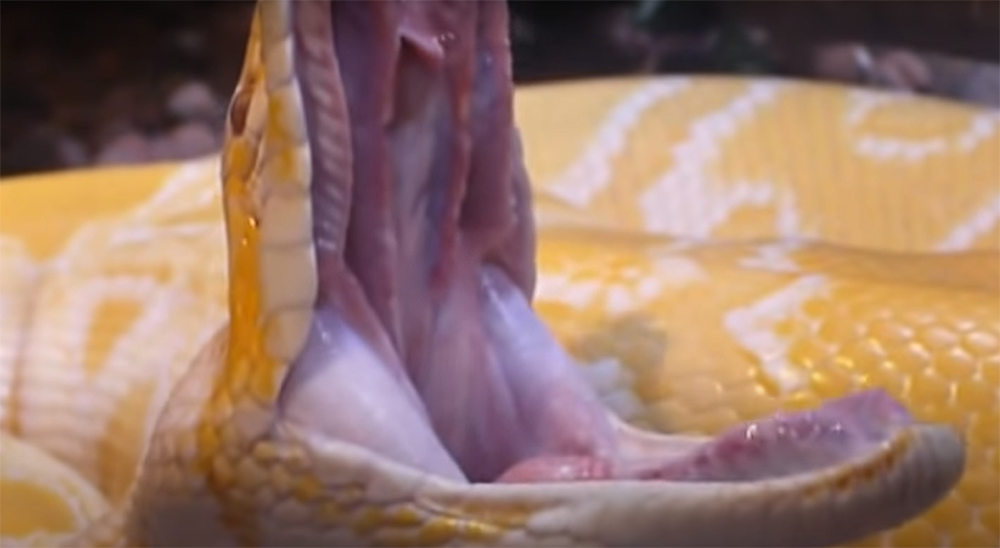
Snakes may yawn if they feel threatened, tired, stressed out over too much noise and activity going on around them (a cage mate moving around all day), or just bored with nothing interesting to do. They’ll also display this behavior after waking up from a long nap – quite literally, they’ll stretch and yawn.
Snakes will also display this behavior when they’re shedding their skin, which is a normal process that happens multiple times throughout the year. The new ‘skin’ underneath looks shiny and moist – not unlike the way your skin looks right after you’ve applied moisturizer or even sunscreen! This can be deceiving to pet owners who think their snake might need moisture from its water bowl when in reality it’s just getting ready to shed its old layer of scales/skin. In fact, giving them additional humidity at this time can actually harm them by trapping bacteria under their scale as the dead cells slough off during molting – yikes! You can tell if your snake is going through a molt by checking for the white, flaky skin under their scales. If you see that, wait about two weeks to do a thorough cleaning of your snake’s enclosure and furnishings – just in time for them to start shedding again!
FAQs
Is snake yawning bad?
Yawning is a sign of stress and anxiety, but it can also be used as an important survival technique. This behavior has been observed among captive snakes who have had to fight for food or space with other snakes. When the snake feels threatened by another snake, he will display a threat gesture known as gaping that involves opening his mouth wide and displaying its fangs in order to scare off the competition. If this fails, then he may yawn open-mouthed while shaking his head from side to side so as to intimidate the challenger even more deeply. If all else fails, your pet snake could resort to actually biting you!
Why do snakes randomly open their mouths?
Snakes yawn for the same reason people do, to draw in more oxygen through their mouths. Humans open their mouth when they are tired or bored and snakes often do this with ease because of how flat their mouths are. Snakes also yawn when they sense danger or feel threatened by another animal nearby.
Why does my snake stare at me?
Your snake might be staring at you to try and tell you something. There are a variety of reasons why they do this, but we will focus on the most common reason: your pet snake is trying to warn you not to come any closer. If your snake continues in its warning behavior (staring, puffing up their body), it’s time for you to leave.
How do you know if a snake is scared?
Snakes don’t have a lot of facial expressions, so it can be hard to tell. However, if you see that your snake is yawning and hissing frequently this could mean he’s scared or threatened by something in the area.
Why do snakes stick their tongue out?
Snakes stick their tongues out because they use them to “smell”. They do this by flicking the tongue in and out of the mouth, which brings air into contact with a special organ that can sense smells (Jacobson’s Organ) on top of their heads. This is also how snakes taste food when they eat it!
Useful Video: Why Do Snakes ‘Yawn’?
Conclusion
Snakes yawn for the same reasons humans do. Yawning is stress-relief, helping them to get oxygen into their lungs at a normal rate and bring dopamine levels back up in cases of anxiety or boredom. This happens when they are exposed to open spaces after being cooped up inside, which can cause stress because snakes have no way to regulate themselves in these conditions. The vast majority of research on this topic has been conducted with captive pythons, but much of it applies across species lines as well making it relevant not just to people who keep pet snakes but also admirers watching them slither by during hikes through nature trails or wildlife excursions where you might encounter one out in its natural habitat.

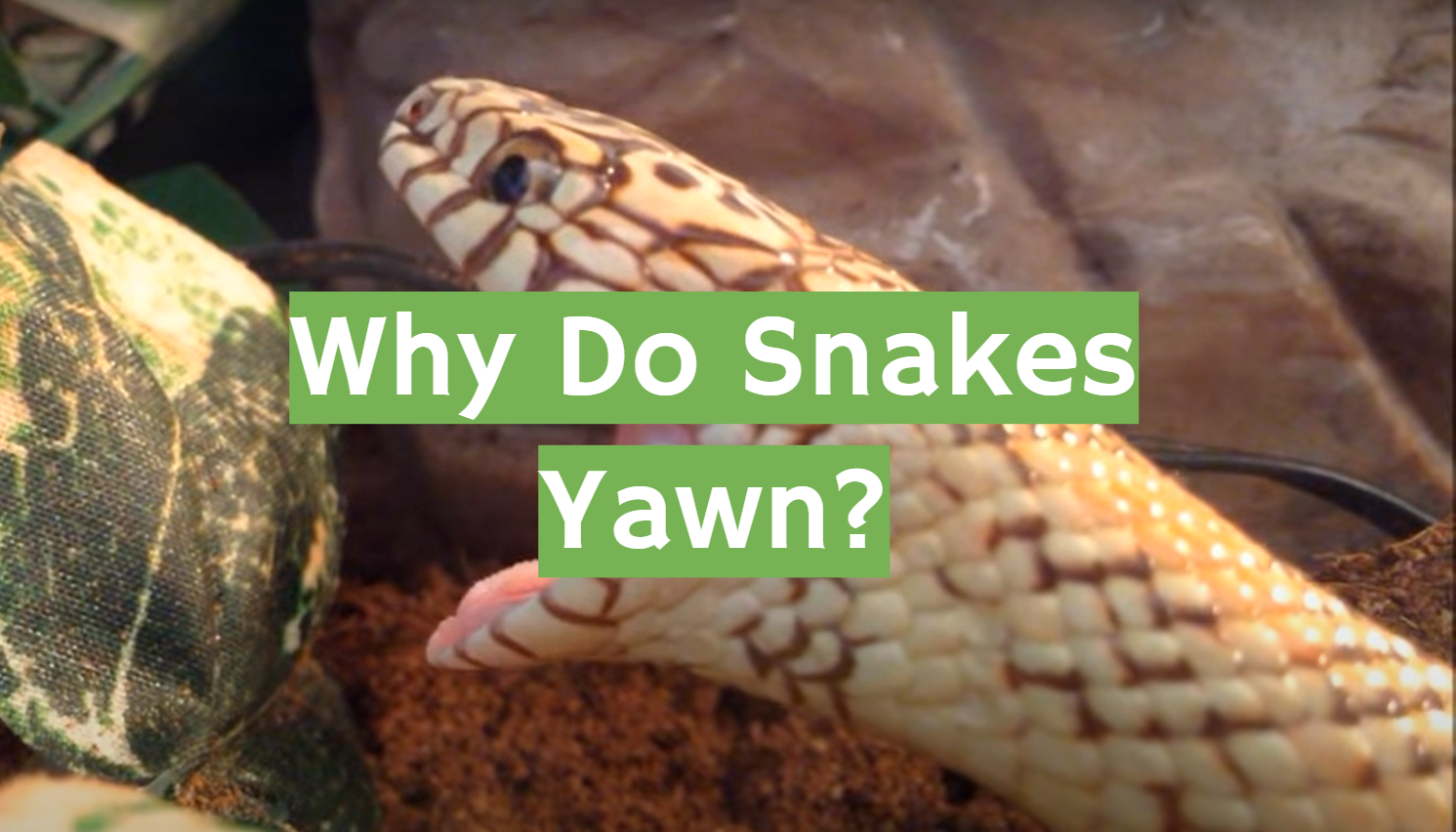


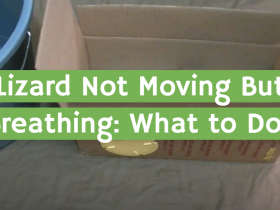

Leave a Review